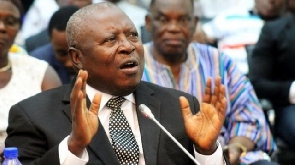What do we want as a nation? Is it a paltry state that takes directions from foreign institutions that work against our national interests? What exactly are our nation’s goals and priorities? Is it the acquisition of self-serving foreign validations to give credibility to an experimental democracy that lacks sustainable institutions, and a viable leadership, to plant the nation’s sleepy legs deep in a slippery rut? Can our nation reflect on her past, and map out a new direction; one that one will make us proud, once again, as Ghanaians? Can our nation become a hub that it once was, and attract international personalities who came to confer with our leadership on global developments? These were, and still are, Nkrumah’s song of lamentation to his dearest nation. Ei, Ghana ebe yeyie ni?
As respected as we are as a nation, our current nation’s brand of leadership have lost their political compass to lead Ghana to resurge her influence on the world stage. How can a leader devote his entire time at the United Nations to talk about global terrorism when his country is hungry, and needs agro-technology to address food insecurity? Since when did a premier nation-state that once towered over Black Africa become a peripheral actor on matters relating to the continent’s welfare? What explains our leadership silence over the murder of forty-four Ghanaians by the Gambia without any call for international condemnation and sanctions? Let’s shed the title we once held as Africa’s beacon of hope, and assume our place as a less significant player in continental Africa’s affairs. Could Jammeh ever have dreamt of killing Ghanaians under Nkrumah’s watch? Not in the years of Methuselah, I believe. Darkness only falls on pristine jungles when the thunderous roars of the lion-king fade with its passage.
Are not the types of the lame political leaders we choose, many of whose background we do not know constitute a hindrance to our nation’s aspirations to break free from the boulders of foreign and self-induced repression? In this day and age, and matter of fact, in the twenty-first century, it puzzles me to see the Ghanaian leadership think that, smiles could replace hard politics, and get the nation what she needs. Why would a nation bypass some of the best of her seasoned diplomats to handpick freshmen and women to handle the nation’s diplomatic business? How does a nation like Ghana reward a bread retailer with a diplomatic appointment? Interestingly, we are told by the thieving marauders that democracy rewards the weak and the unlearned too.
There are many things that we claim to know, yet do not know. For the many unknowns are the treasures of knowledge, which if tapped into, may hold the magic key to our nation’s depressing status as a quasi-state. I know many here would question me about my labelling of Ghana as a quasi-state, and my reasons are simple. A quasi-state is a nation that can barely feed its citizens on its domestic agro-yields, and begs the international partners for a supplemental. It is one whose porous borders attract international narco-investors who bribe their way to the upper tiers of power, and establish a foothold in our economy. A quasi state is nation whose leader makes it a ritual to beg his peers for loans to fund basic social programs such as the nation’s selective school-feeding program. Maybe, we could add toilet rolls to the president’s shopping list when he recuperates from his accident, and embarks on his trademark hobby; traveling to accumulate more air miles, which he may need while on retirement.
Being who you are is to remain who you are, and not project an image that you are not. Doesn’t the president’s attempts mutate into Africa’s personality, while he remains a devoted “ahenefie krakye” go against our national values in preserving Africa’s dignity and individuality? Why should a president adorn himself in French couture when attending an international conference, yet wears his “adinkra” and “tsokoto” when attending funeral at home? Should the Ghanaian leader only profess the values and beauty of indigeneity only when he feels comfortable in making himself the shining example of Ghana’s cultural personification?
Unlike Osageyfo Kwakwaduam Kwame Nkrumah, our nation’s current leaders have neither intellectualized, or internalized the satisfying rewards of leadership, but have rather ingested an imaginary concept that mistake leadership for lordship, and treats the subaltern as subservient actors in the scheme of contemporary democratic governance. To Nkrumah, leadership was about service to the nation, and not to be served. It was a position that requires shouldering the nation’s pain in times of need, and not absconding to an undisclosed location to escape the pressures that attended the flooding of the Northern regions of Ghana.
Obenewaa does not despise her nation, but she only concerned about the inadequate input of a leadership whose depraved stance on certain policies make one squirm with frustration, and would want to bite leadership by its ear for a change. We can choose to defend the all the irrationalities we see in Ghanaian politics, and wish that they go away. After all, our edifuo-politcians have done exactly the same, yet failed. In days gone by, they have held Church vigils to thank God for saving the president’s life, and blame Satan, and not the nation’s roads, for the president's accident.
Our nation history is entertaining enough to become a standup comedy. Nkrumah is vindicated on his views about a leadership that rewards the governed with less, and creates an artificial need to enslave them under the facade of “wonso ka bi.” The fault, it is said, lies in, and with, us, and not with an imaginary apparition that we appellate to solve our mundane problems, which are self-inflicted. Are we a serious nation? Hope all is well. Good day and cheers.



















